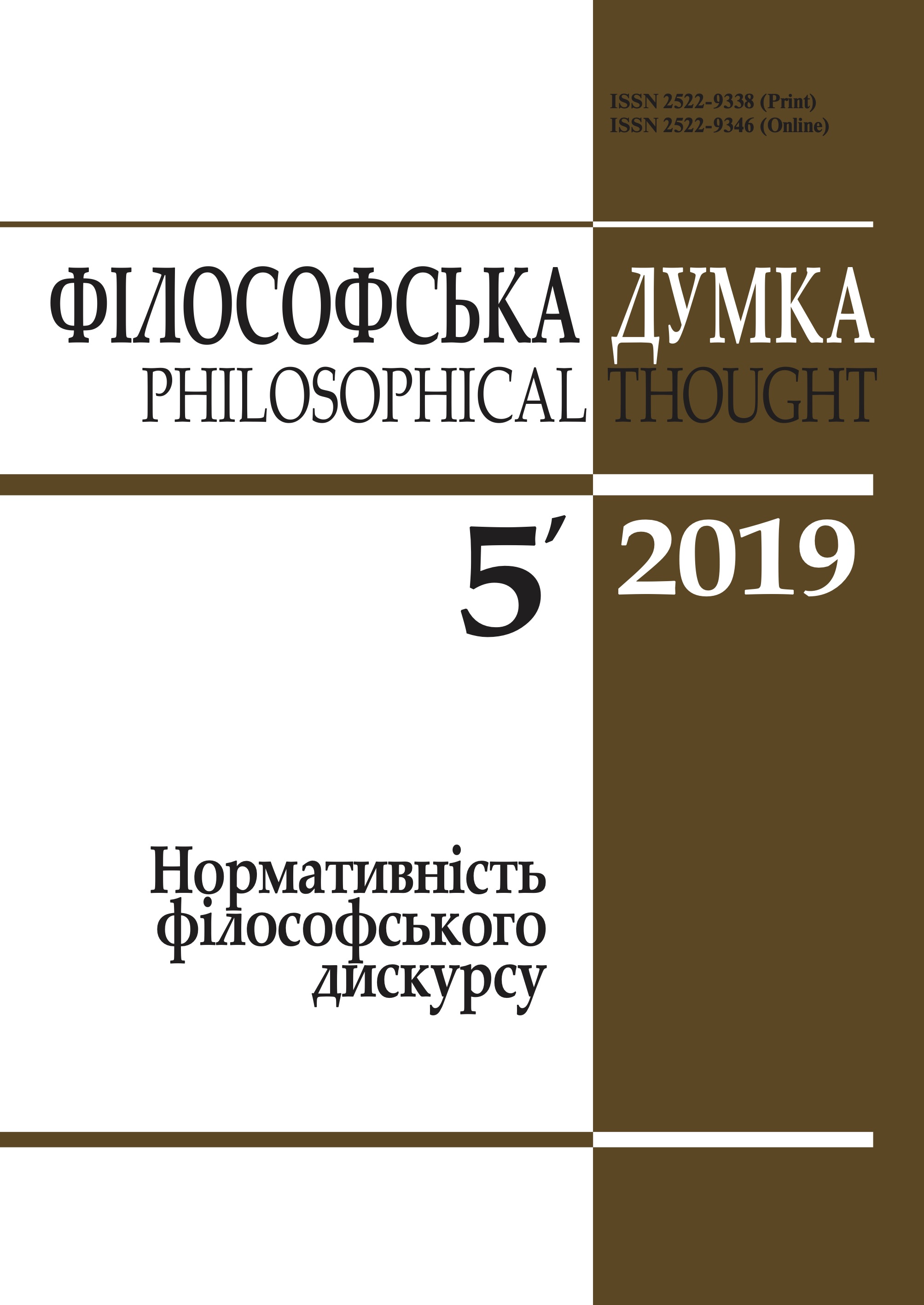Теорія значення, деференція і нормативність
DOI:
https://doi.org/10.15407/fd2019.05.040Ключові слова:
нормативність, значення, деференція, референційне запозичення, експертиАнотація
У процесі функціонування природної мови, мовленнєвої комунікації постійно виникають нові регламентації й вимоги, що набувають статусу норм. У статті розглядаються (1) взаємодія значення і нормативності і 2) процес утворення норм через соціолінґвістичну практику, а саме – через поняття деференції осмислюється феномен запозичення понять, знань, інформації від інших людей, лінгвістичних спільнот і джерел інформації. За допомоги деференції позначається й описується той бік смислових стосунків, коли ми покладаємось на чужі думки, знання, що їх ми вважаємо достовірними й авторитетними. Це може відбуватись як свідомо, так і несвідомо. Носіями норми, на яку ми покладаємось, можуть бути як окремі індивіди, групи, так і великі лінгвістичні спільноти. Деференційний механізм фіксує той факт, коли учасники комунікації можуть досить успішно користуватися і міркувати за допомоги понять, мало або зовсім не розуміючи їх справжнього змісту. Розкривається існуюча в суспільстві тенденція до нормативізації, уніфікації мови і мовлення і виправлень всього того, що не узгоджується з загальноприйнятим уживанням слів, значень, норм. Проаналізовано розрізнення того, як діють норми у закритих мовних спільнотах і дослідницьких експертних групах, що здатні до «структурної кооперації» і функціонального визначення норм.
Посилання
Mannheim, K. (2000). Selected works. Sociology of cultures. [In Russian] St. Petersburg: University Book.
Passmore, J. (2002). Modern philosophers. [In Russian] Moscow: Idea-Press.
Anderson, C., Willer, R., Kilduff, G.J., Brown, C.E. (2012). The origins of deference: When do people prefer lower status? Journal of Personality and Social Psychology, 91 (6), 1094-1110.
Austin, J.L. (1962). How to do things with words. Oxford: Clarendon Press.
Austin, J.L. (1970). Other Minds. In: J.L. Austin, Philosophical Papers.
Bunderson, J.S. (2003). Recognizing and utilizing expertise in work groups: A status characteristic perspective. Administrative Science Quarterly, 48, 557-591.
https://doi.org/10.2307/3556637
Cooper, W.E. (1976). Gricean Deference. Metaphilosophy, 7 (2, April). 91.
https://doi.org/10.1111/j.1467-9973.1976.tb00623.x
Davidson, D. (1991). Three Varieties of Knowledge. In: A.Ph. Griffiths (Ed.), Royal Institute of Philosophy Supplement (pp. 153-166). New York: Cambridge University Press. (Reprinted in: Subjective, Intersubjective, Objective (2001). Philosophical Essays, 3, 205-220). Oxford: Clarendon Press.)
https://doi.org/10.1093/0198237537.003.0014
De Brabanter, N.V., Fernandez, D., Nicolas, I., Stojanovic, M. (2005). Deferential Utterances. Retrieved from: http://jeannicod.ccsd.cnrs.fr/ijn_00000575/document
Devitt, M. (2011). Deference and the Use Theory. ProtoSociology, 27, 196-211.
https://doi.org/10.5840/protosociology20112711
Glüer, К. (2011). Donald Davidson: A Short Introduction. New York: Oxford University Press.
https://doi.org/10.1093/acprof:osobl/9780195382976.001.0001
Glüer, K., Wikforss, Å. (2018). The Normativity of Meaning and Content. In: E.N. Zalta (Ed.), The Stanford Encyclopedia of Philosophy. URL = https://plato.stanford.edu/archives/spr2018/entries/meaning-normativity
Grice, H.P. (1989 [1961]). Causal theory of perception. In: Grice, H.P., Studies in the Way of Words. Cambridge, Mass.
Hofstadter, D. (2001). Gödel. Escher. Bach: this endless garland. [In Russian] Samara: Bahrach-M Publishing House.
Horwich, P. (2005). Reflections on Meaning. Oxford: Oxford University Press.
https://doi.org/10.1093/019925124X.001.0001
Joshi, A., Knight, A. (2014). Who Defers to Whom and Why? Academy of Management Journal, April, 1--67.
https://doi.org/10.5465/ambpp.2014.301
Mulligan, K. (1999). Justification, Rule-Breaking and the Mind. Proceedings of the Aristotelian Society, 99, 123-139.
https://doi.org/10.1111/1467-9264.00051
O'Madagain, C. (2016). Outsourcing Concepts: Deference, the Extended Mind, and the Expansion of our Epistemic Capacity. In: A. Clark, J.A. Carter, J. Kulestrup, S.O. Palermos, D. Prichard (Eds.), Socially Extended Knowledge. Oxford: Oxford Iniversity Press.
Putnam, H. (1975). Mind, Language, and Reality. Camdridge: Cambridge University Press.
https://doi.org/10.1017/CBO9780511625251
Quine, W. (1960). Word and Object. MIT, Library of Congress, CC: 60-9621.
Recanati, F. (2001). Modes of Presentation: Perceptual vs Deferential. Building on Frege: New Essays on Sense, Content, and Concept. Albert Newen, Ulrich Nortmann and Rainer Stuhlmann-Laeisz. Ed. CSLI Publications: 197-208.
Woodfield, A. (2000). Reference and Deference. Mind and Language, 15, 433-451
##submission.downloads##
-
PDF
Завантажень: 572
Опубліковано
Як цитувати
Номер
Розділ
Ліцензія
Автори, які публікуються у цьому журналі, згодні з наступними умовами:
- Автори зберігають авторське право і надають журналу право першої публікації.
- Автори можуть укладати окремі, додаткові договірні угоди з неексклюзивного поширення опублікованої журналом версії статті (наприклад, розмістити її в інститутському репозиторії або опублікувати її в книзі), з визнанням її первісної публікації в цьому журналі.
- Авторам дозволяється і рекомендується розміщувати їхню роботу в Інтернеті (наприклад, в інституційних сховищах або на їхньому сайті) до і під час процесу подачі, так як це може привести до продуктивних обмінів, а також скорішого і ширшого цитування опублікованих робіт (див. вплив відкритого доступу).


